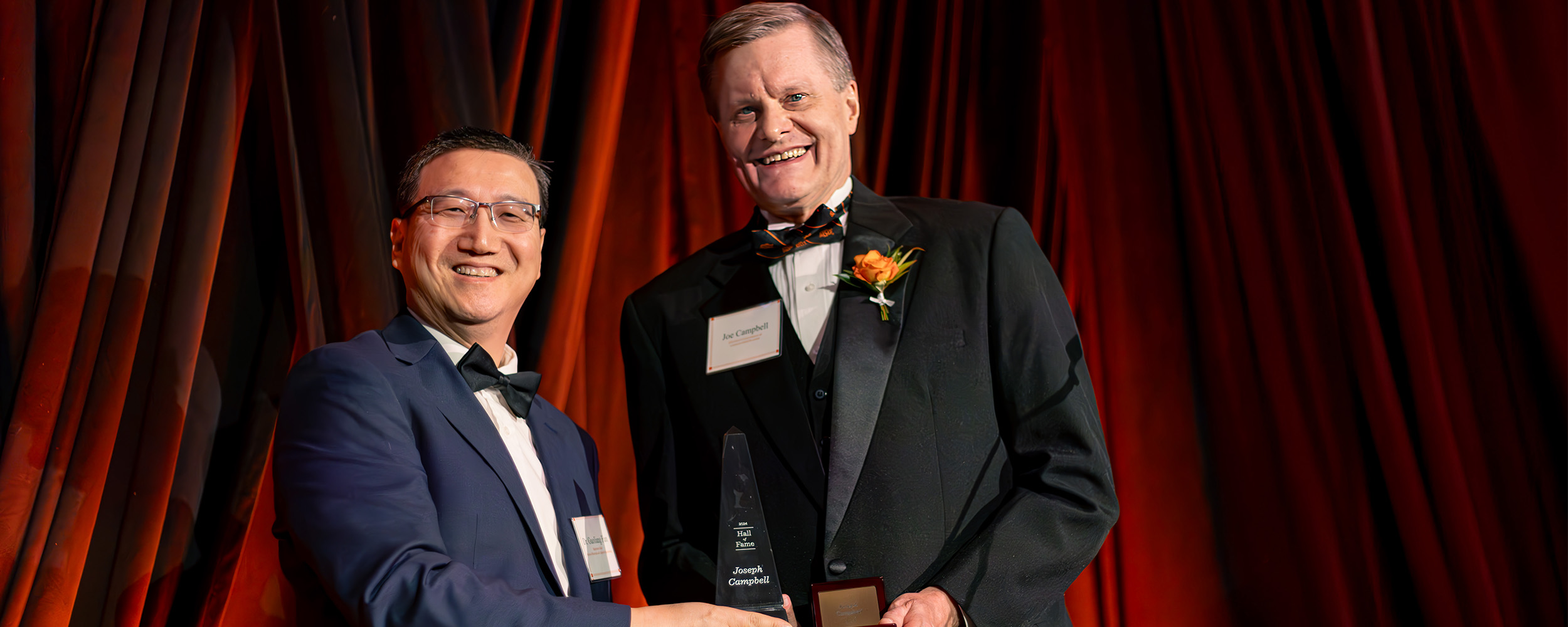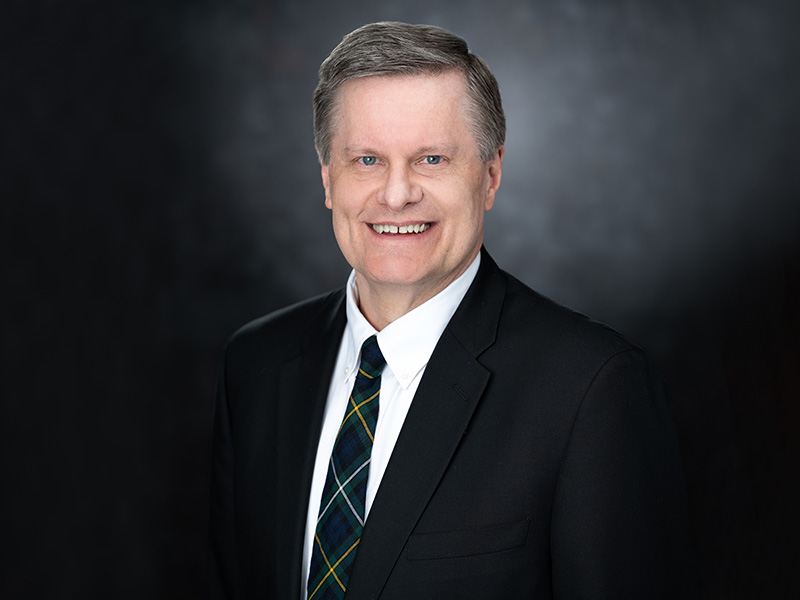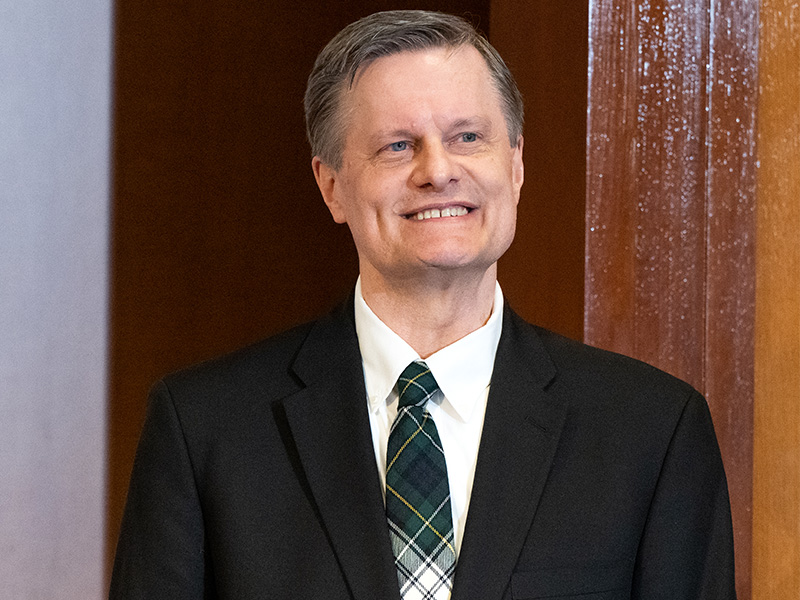
Powered by Purpose: How OSU sparked a national security pioneer's legacy
Friday, August 22, 2025
Media Contact: Kristi Wheeler | Manager, CEAT Marketing and Communications | 405-744-5831 | kristi.wheeler@okstate.edu
From the halls of Oklahoma State University to the frontlines of national defense, Dr. Joseph Campbell’s career in voice biometrics and artificial intelligence was shaped by a moment of inspiration in Stillwater, Oklahoma.

Campbell’s path to becoming a leader in secure communications and AI was amplified by a chance encounter with Dr. Rao Yarlagadda on the OSU campus — and it changed the course of his life.
Before earning his Ph.D. in electrical engineering from the College of Engineering, Architecture and Technology in 1992, Campbell had already begun a promising career at the National Security Agency, where he co-developed the foundational Federal Standards 1015 and 1016 voice coders. These standards enabled secure voice communications over ordinary phone lines — critical to national security during a pivotal time in history.
But it was a visit to an NSA-sponsored Speech Research Symposium at OSU in the 1980s that redirected his professional trajectory. There, he met Yarlagadda, a Regents Professor at OSU known for his pioneering work in time-series analysis and speech processing. That meeting sparked a mentor/mentee relationship that would lead Campbell to pursue his doctorate in Stillwater.
"My NSA Fellowship gave me the opportunity to go anywhere, but it was OSU, and that conversation with Dr. Yarlagadda, that made the decision easy,” Campbell said.
At OSU, Campbell’s research contributed to the advancement of voice biometrics — technology now used to identify individuals based on distinguishing vocal, speech and language patterns. He wrote a landmark paper that informed the NSA’s third-generation Secure Terminal Unit, published in the peer-reviewed journal, Digital Signal Processing, for which Yarlagadda was a founding editor.
Encouraged by his mentor, Campbell also published a portion of his dissertation in the Proceedings of the IEEE, an article that has since been cited over 2,700 times.
Learn more about Dr. Campbell's research at MIT
“The environment at OSU gave me more than academic training,” Campbell said. “Through Dr. Yarlagadda, the best advisor anyone could hope for, I gained independent research and leadership skills that I’ve carried through my career and passed on to future generations. I also built a lasting network of colleagues and friends who continue to support me, all within the warm and welcoming Stillwater community.”
That foundation propelled Campbell into some of the nation’s most important work in data and speech analysis. In 2012, while at the Massachusetts Institute of Technology Lincoln Laboratory, Campbell contributed to DARPA-funded efforts to identify illegal activity, including human trafficking, using AI technologies. The initiative was later featured on 60 Minutes for its critical role in national defense to dismantle trafficking networks.
Campbell went on to lead MIT Lincoln Laboratory’s AI Technology and Systems Group, directing innovations in human language technologies, multimedia processing and cybersecurity. In 2022, he was honored with the Lab’s Technical Excellence Award and promoted to Laboratory Fellow. Today, he leads a national study to advance AI technologies tailored for national security — moving beyond widely known generative and agentic AI toward next-generation AI for national security. While driving these advances, Campbell remains equally committed to mentoring others and building diverse teams.
In 2024, Campbell was inducted into the CEAT Hall of Fame and was awarded the Lohmann Medal, the college’s highest honor.
Despite his high-level accomplishments, Campbell remains grounded in the values OSU instilled.
For Campbell, OSU wasn’t just a stop on his academic path; it was the launchpad that helped him shape technologies, save lives and mentor the next generation of innovators. His journey is a reminder that with the right environment and the right people, a single moment at OSU can change the world.
Reinvention is key. Don’t be afraid to try new things, mentor others, and share your experiences. There’s almost nothing more rewarding than helping others succeed.
Dr. Campbell's work with the DARPA Memex program
- U.S. News & World Report - How Big Data Battles Human Trafficking
- 60 Minutes - DARPA: Nobody's Safe on the Internet
- 60 Minutes Overtime - New Search Engine Exposes the "Dark Web"
- Scientific American - Human Traffickers Caught on Hidden Internet
- Forbes - Watch Out Google, DARPA Just Open Sourced All This Swish 'Dark Web' Search Tech
- NPR - Investigators Use New Tool to Comb Deep Web for Human Traffickers
- RollingStone - Dead End on Silk Road: Internet Crime Kingpin Ross Ulbricht's Big Fall
- Popular Science - The Man Who Lit the Dark Web: Data-mining Tools Are Helping Cops Bust Open Online Human Trafficking
- The Guardian - Panama Papers Investigation Wins Pulitzer Prize

Read more about Dr. Campbell's work with the DARPA Memex program to combat human trafficking, illegal weapons and drug trafficking, and illegal financial operations.
